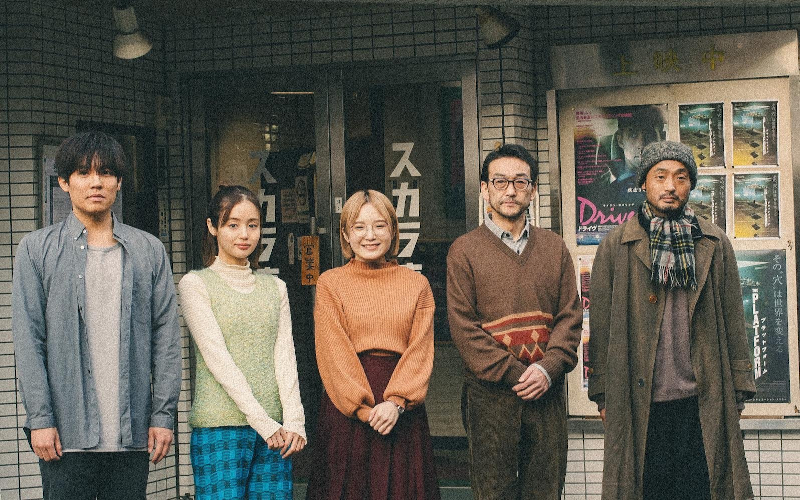Director – Hideo Jojo – 2022 – Japan – 99m
*****
Two homeless men find a new spiritual home at a run-down, local cinema which, like them, is struggling to survive – plays UK cinemas in the Japan Foundation Touring Film Programme 2024 between Friday, 2nd February and Sunday, 31st March
Down on his luck in his home town of Ginpei-cho, Takeshi Kondo (Keisuke Koide fromShin Godzilla, Hideaki Anno, Shinji Higuchi, 2016) is napping by the riverside in daylight. Along comes another tramp Sato (Shohei Uno from A Far Shore, Masaaki Kudo, 2022; 37 Seconds, Hikari, 2019) to sell him a flier for money and, when Kondo is distracted by the arrival of his old friend Kumika, to steal his bag. After Kondo tracks Sato down and retrieves his bag – “sorry, it’s a habit”, says Sato – the two tramps respond to an ad claiming it can help them play the system and receive welfare payments. Sadly, the people behind the scheme will turn out to be, as a fellow tramp vocally suspects, crooks with a whole other moneymaking agenda.

Kondo attends welfare-claiming training sessions with Sato, but his heart isn’t in it. Instead, he wanders off and walks into the Scala theatre, a repertory cinema currently showing a double bill of Casablanca (Michael Curtiz, 1942) and The Third Man (Carol Reed, 1949). The name Scala recalls that of the legendary, and considerably sleazier, British repertory cinema which was the subject of recent documentary Scala!!!, (Jane Giles, Ali Catterall, 2023), which may or may not be coincidental.
Somehow, Kondo gets part-time work from the cinema’s manager Kajiwara (Mitsuru Fukikoshi from Sion Sono’s Himizu, 2011; Cold Fish, 2010, Love Exposure, 2008), however, given the place is sinking in debt, and employees Erika (Sakura Fujiwara), and Miku (Nanami Hidaka from Love and other Cults, Eiji Uchida, 2017; Tag, Sion Sono, 2015) are constantly asking why they haven’t yet been paid, Kondo is unlikely to earn much from working there. Yet since movies are in Kondo’s DNA, he fits right in, doing menial tasks like emptying the bins, and is allowed to sleep on the premises, which beats sleeping on the street.

Owner Kajiwara may be a former lawyer, but as his friend Yoko remarks over a game of Mah Jonng, while he may love movies and movie theatres, he lacks the business sense needed to turn them into going concerns. Nevertheless, he acts as a movie buff magnet for the cinemas regulars: struggling actor Watanabe (Ayumu Nakajima from A Far Shore, Masaaki Kudo, 2022; Wheel of Fortune and Fantasy, Ryusuke Hamaguchi, 2021), aspiring screenwriter Nasu (Kenta Kiguchi), trumpet player Shirakawa (Takaya Koroda), and schoolboy Kawamoto. Also to be found in the building is projectionist Taniguchi (Hiroyuki Watanabe from Labyrinth of Cinema, Nobuhiko Obayashi, 2019).

With the cinema’s 60th anniversary coming up, the regulars want to put on a commemorative, fundraising event. One night, Kajiwara discovers Kondo on his laptop looking at rushes of an unedited film starring his late wife and surmises that the trauma of bereavement stopped the director that Kondo is now revealed to be dead in his tracks.
Word gets around the regulars and staff, and it’s suggested that Kondo complete the film for a one-off screening as part of the fundraiser. Kajiwara also has his eye on another film Director Blues, a debut by young woman director Yumiko Taniuichi about an alcoholic film director loosely based on her late father. Another regular at the cinema, she learns from Kondo that what stopped him completing his film was not his wife’s death, but that his assistant director Ryotaro suddenly and unexpectedly committed suicide after the shoot.

Sato the tramp, meanwhile, is lured into the cinema by the prospect of watching Casablanca again. When they learn that the ‘welfare’ scam is about to catch up with him, the other cinema regulars vow to help him. Kajiwara rises to the occasion by thwarting the scam company’s lady boss with dire legal consequences if that don’t sort the situation out and extricate Sota from the impending financial difficulties the scam has caused him.

As the narrative builds towards the staging of the fundraiser, Sota’s prominence increases in the narrative, promoting his role to much greater significance than previously expected.
This is a generous and likeable study of a declining local cinema and the small community that both congregates around it and rallies round to keep it going in hard times. The staff and patrons are nicely drawn, and you feel you want to spend time with them and would be happy to have the place as your local cinema. The piece is also effective in showing the toll the movies can take on the lives of those working on them, whether in production or exhibition, and on their families.

Although it starts off with homeless people, that element of the film is nicely judged and never allowed to get in the way of the main thrust of the film, the story of the local cinema. A comparison with two British films may be apt. One, contemporary to the current film, is the infuriating Empire of Light (Sam Mendes, 2022) which walked straight into the trap that this film avoids by having several competing plot strands competing for the audience’s attention with the main narrative about the run-down cinema. The other, the much older and altogether more marvellous The Smallest Show on Earth (Basil Dearden, 1957) demonstrates a similar love for a struggling local cinema likewise populated with quirky characters who, in the course of the narrative, come into their own without derailing the story.
In short, Twilight Cinema Blues is a sweet, little gem of a movie likely to be enjoyed by anyone who has ever taken pleasure in visiting their local cinema.
Twilight Cinema Blues plays UK cinemas in the Japan Foundation Touring Film Programme 2024 between Friday, 2nd February and Sunday, 31st March.
Trailer:
